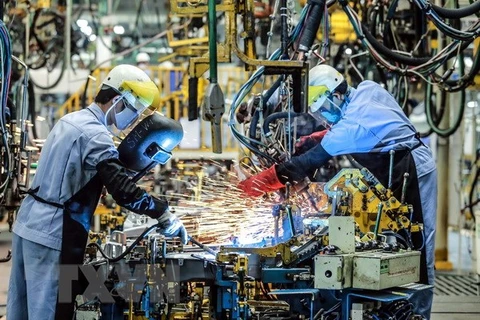Hanoi (VNA) – Financial institutions and research organisations at home and abroad have shown their optimism about Vietnam’s economic growth in the second half of 2018 and the whole year.
The International Monetary Fund (IMF) has projected Vietnam’s economy to grow by 6.6 percent in 2018 and the inflation rate to be kept under 4 percent thanks to the country’s economic reform and its Government’s commitment to stabilise the macro economy.
The Asian Development Bank (ADB) also forecast the economy will expand by 7.1 percent this year, while the World Bank (WB) raised its forecast for Vietnam’s economic growth to 6.8 percent.
The Central Institute for Economic Management (CIEM) was optimistic that Vietnam’s growth can reach 6.71 percent instead of 6.67 percent as previously predicted.
Macroeconomic indicators are bright, such as the yearly export growth is projected at 12.11 percent, trade surplus 1.2 billion USD, and average inflation 3.93 percent.
The momentum for economic growth has been maintained, not based on the monetary expansion but associated with changes in business environment.
The gross domestic product (GDP) expanded by 7.08 percent in the first six months of the year, the highest level since 2011. Additionally, the confidence of businesses has been reinforced.
At the recent mid-term Vietnam Business Forum (VBF) in Hanoi, Dominic Scriven, Executive Chairman of Dragon Capital, said the attractiveness of financial markets in emerging countries declined in the past six months of the year due to the China-US trade dispute and the rising USD interest rate.
However, Vietnam still attracted 1.5 billion USD in investment, and this proved the trust of investors in the Southeast Asian country, he added.
Besides the aforesaid achievements, the socio-economic performance exposed some shortcomings and challenges that need to be addressed.
According to economists, the economic growth question is not as worrisome as inflation – which is hoped to be kept below 4 percent or lower in 2018.
However, a number of unfavorable factors have surfaced and caused high inflation in May and June such as the price hike of domestic food and and global oil. Especially, the inflation in June expanded at the highest pace over the past seven years.
Risks from natural disasters such as floods and typhoons as well as the adjustment of some commodities priced by the State are defined as one of the factors that cause inflation hike.
At the monthly meeting in July, Prime Minister Nguyen Xuan Phuc affirmed the Government’s resolve to keep inflation under control, stressing that the Government will not change economic and financial policies for the rest of the year.
Changes will not be made to environmental taxes on oil and petroleum products, value added tax, and prices of some public services and commodities such as electricity and healthcare, he added.-VNA
VNA
























